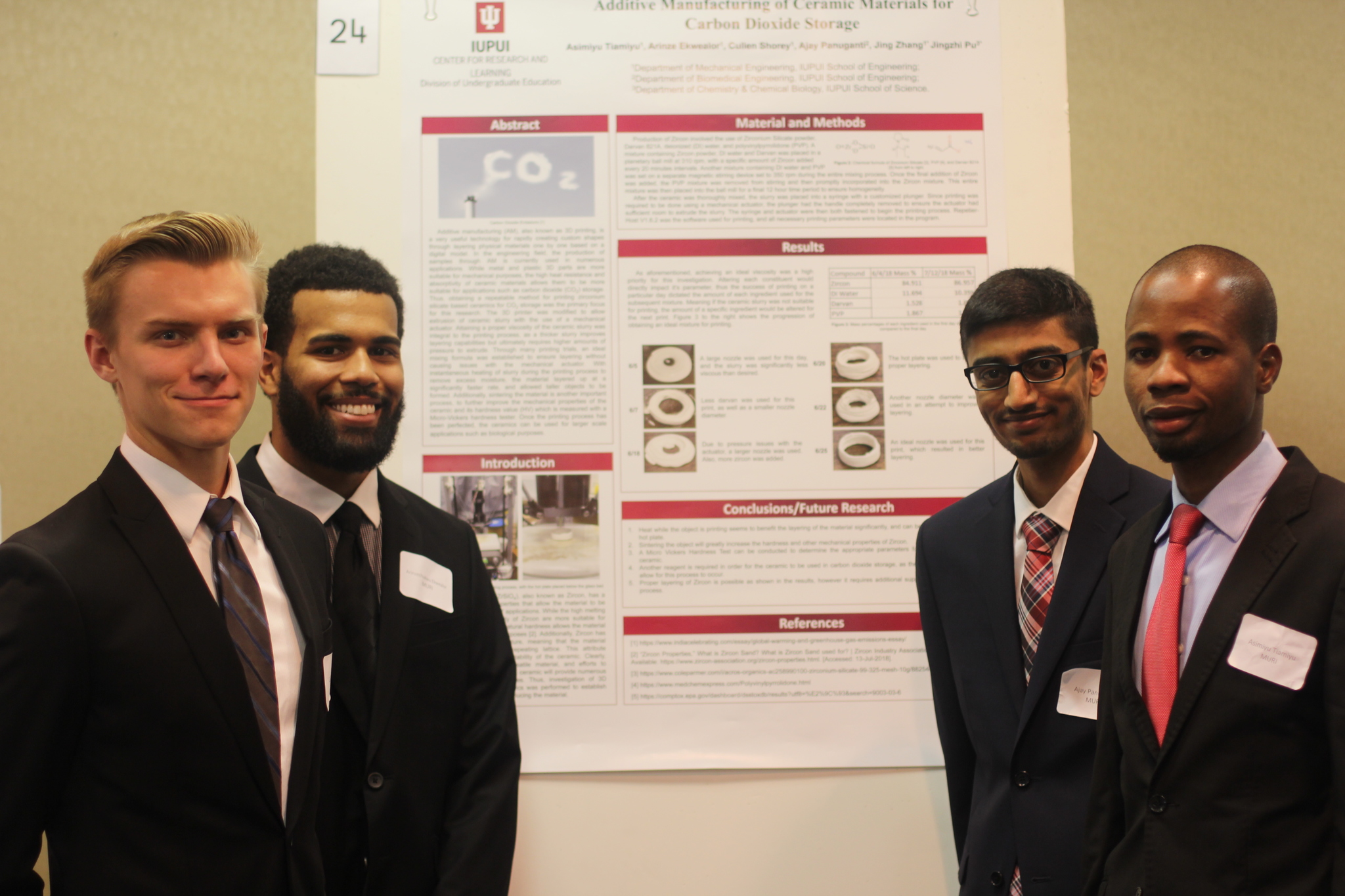Applying for MURI project awards

Supporting team-based, mentored, multidisciplinary undergraduate student research experiences
Overview of MURI
MURI facilitates the creation and support of multidisciplinary research teams consisting of undergraduate students, graduate students, post-docs, senior staff, and faculty. These teams provide undergraduate students with a unique opportunity to work with mentors on real-world problems to gain research skills that can be applied to their college coursework and future careers.
In this program, students acquire research skills (e.g., literature review, research methodology, data collection and analysis), learn about ethics in research and scientific writing, and improve their oral communication skills by presenting their research at either the annual IU Indianapolis Student Research and Creative Activities Day in the spring semester (usually at the end of April) or the IEL Summer Poster Symposium (usually at the end of July).
MURI projects should represent two or more disciplines and should offer undergraduate students the opportunity to engage in a substantive research experience focused on a significant research problem. Projects from all disciplines are most welcome, including science, informatic, math, the social sciences; the arts and humanities; and social, environmental, and public policy.
Applying for MURI project awards
MURI student learning outcomes
- Investigate a research question and scholarly pursuit/activity in a collaborative, team-based mentored experience that encompasses multiple disciplines, fields and/or perspectives
- Identify and utilize appropriate methods, procedures, and ethical principles for the gathering of information or the generation of new knowledge through scholarly activity
- Analyze, assess, and evaluate findings and conclusion
- Disseminate the results of scholarly activity through appropriate dissemination outlets
MURI program structure
The MURI program offers a unique, high-impact, interdisciplinary, faculty-mentored research for a team of undergraduate students. In our commitment to increasing and ensuring access to high-impact practices (such as undergraduate research) for students of all backgrounds, especially Black students, Latinx students, American Indian/Alaska Native students, Native Hawaiian/Pacific Islander students, first-generation students, and students from underrepresented groups, we encourage you to take a culturally inclusive approach to recruitment of students for this experience.
Please share your opportunity broadly and intentionally encourage a diverse pool of students, especially those with limited or no prior research experience, to apply for MURI experiences. We encourage mentors to consider where and how they recruit, utilizing a variety of platforms and spaces across campus.
MURI facilitates the creation and support of multidisciplinary research teams consisting of undergraduate students, graduate students, post-docs, senior staff, and faculty.
MURI is a mentored undergraduate research experience. Two or more faculty members (referred to as mentors throughout this page and in the application) apply for MURI funding support once a year using the application link below. Financial support for the MURI program is provided by the Institute for Engaged Learning.
MURI proposal guidelines
Mentors may submit a MURI proposal applications starting Monday, February 10th through Friday, March 28th.
The application requires mentors to specify one of the following project durations:
- Summer only: project will run during the upcoming summer term.
- Academic year only: project will run during the next academic year.
- One-full year: project will run during the upcoming summer term and the next academic year.
Proposal applications must meet the following guidelines:
- At least two mentors representing different disciplines must be identified on the MURI proposal application.
- MURI research teams may comprise at least three undergraduate students and a maximum of six. All students will be paid $14 per hour. A separate application process is required if the mentor would like to be considered for supply funds.
- Once the mentor has selected students for the MURI project, they will need to identify to IEL which students they are hiring through a form. Students will then be hired directly through the Division of Undergraduate Education (DUE). IEL will facilitate the hiring process for the student with Human Resources.
- Students may work up to 10 hours per week during the academic year (fall and spring semesters) and up to 25 hours per week in the summer (summer term). Students may not work more than 29 hours per week across all positions at Indiana University.
- Mentors are responsible for ensuring that the project secures required approvals from the university related to research compliance, human subjects, and IRB (institutional review board).
MURI application process
Step 1: Apply for MURI funding
The first step is to submit your MURI project application.
Step 2: Application review
A committee in IEL will review MURI application submissions. Applicants will be notified of their application status by mid-April. A separate application process is required if the mentor would like to be considered for supply funds.
The mentor will receive an email from the Institute for Engaged Learning when students can start being selected for the approved project. The mentor can create a job listing in Handshake if they need assistancein finding students. Interview pools should have a minimum of three candidates.
The mentor will receive an email from the Institute for Engaged Learning when the position is posted and students can begin applying through Handshake. The mentor will review applications in Handshake, conduct interviews, and make a hiring decision. Interview pools should have a minimum of three candidates.
Step 3: Initiate hiring process
Once the mentor has selected students for the MURI project, they will need to identify to IEL which students they are hiring through a form. Students will then be hired directly through the Division of Undergraduate Education (DUE). IEL will facilitate the hiring process for the student with Human Resources.
Step 4: Orientation resources for mentors and students
The Office of Student Employment has wonderful resources for mentors who supervise students on MURI projects.
Terminating a student’s employment: Please let us know when a student has left your project for another opportunity or if their employment had to be terminated.



